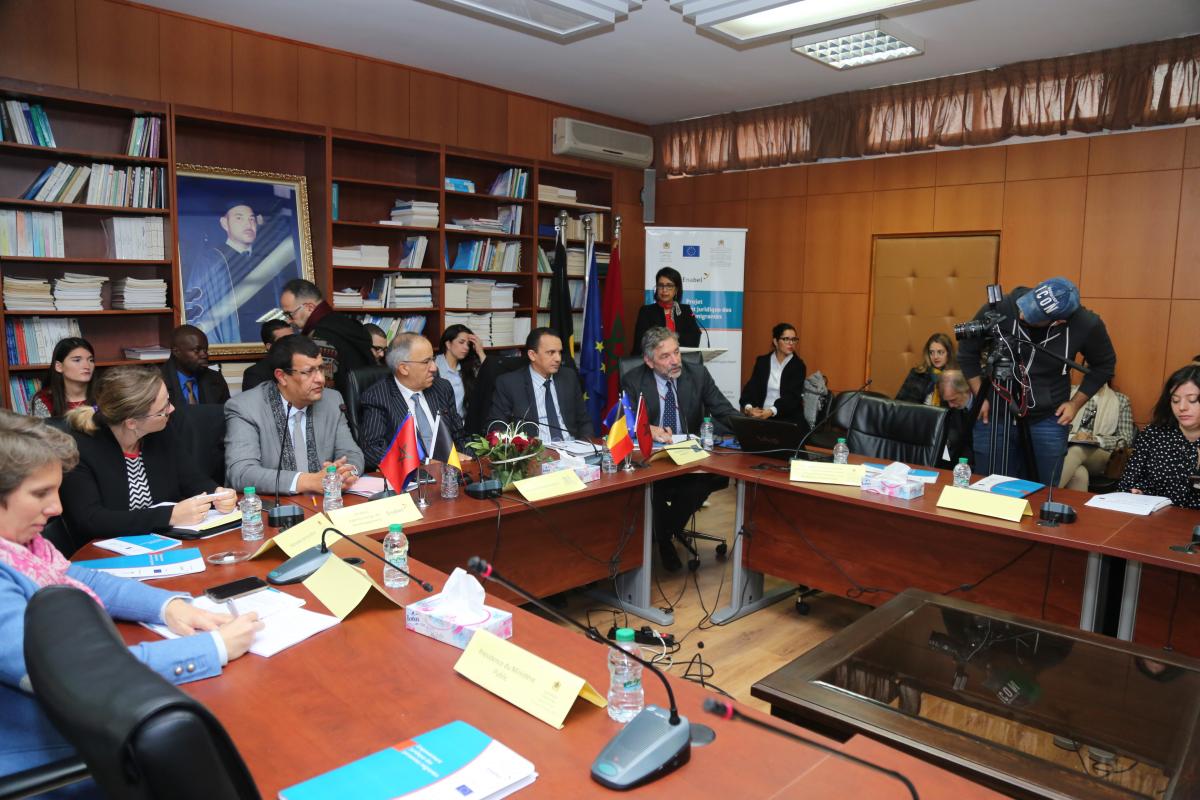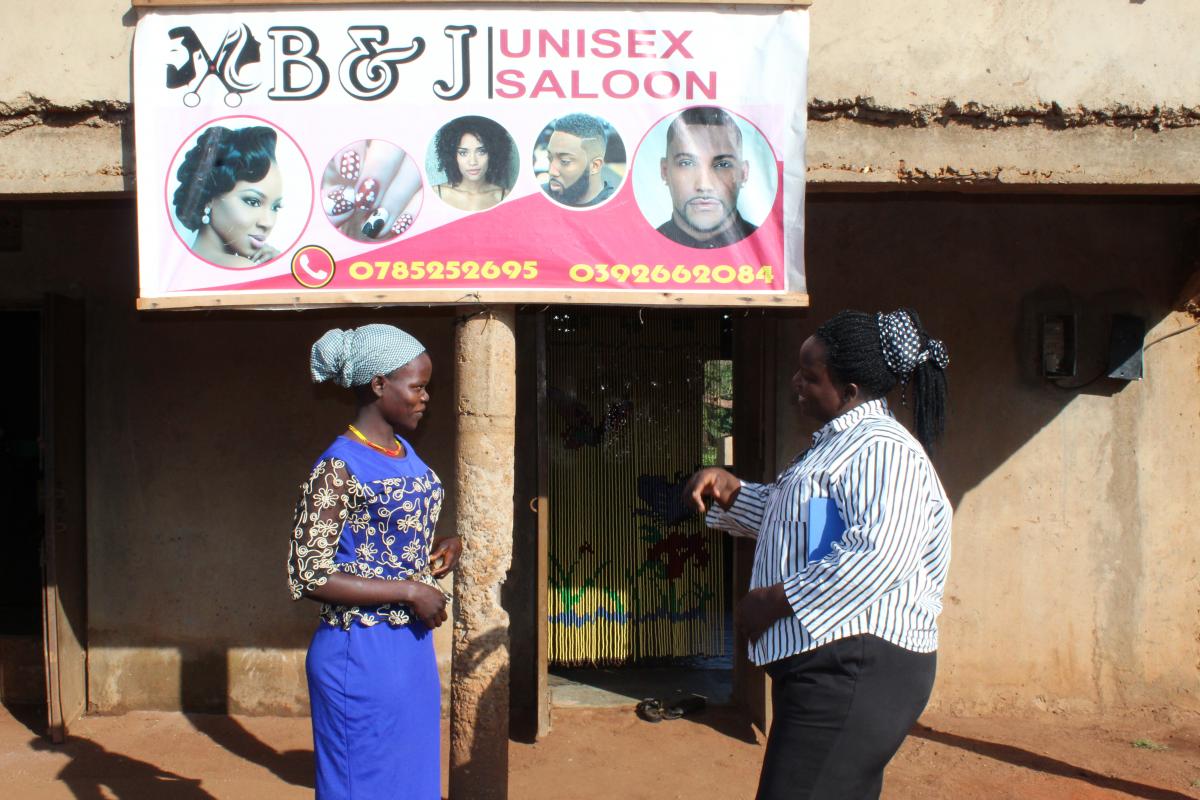Rechercher
Affichage de 2250 à 2265 sur 3123 actualités
-
Première rencontre nationale des cliniques juridiques sous le thème « Les cliniques juridiques et les autres acteurs du droit : quel rôle pour un renf
Bilal ALJOUHARI | 23/12/2019
La clinique du droit de l’université Mohammed V de Rabat et le projet « Empowerment juridique des personnes migrantes au Maroc » ont organisé une rencontre sous le thème « « Le rôle des cliniques juridiques et des autres acteurs du droit dans le renforcement de l’accès aux droits des migrants, réfugiés et demandeurs d’asile » le 13 décembre, à la Faculté des sciences juridiques économiques et sociales de l’université Mohamed V, Agdal, Rabat Cette rencontre a été organisé dans le cadre du projet « Empowerment juridique des personnes migrantes » financé par l’Union européenne, au travers du Fonds fiduciaire d’urgence - fenêtre Afrique du Nord, et mis en œuvre par Enabel en partenariat avec le Ministère de la justice et le Ministère délégué auprès du Ministère des Affaires étrangères, de la Coopération africaine et des Marocains résidant à l’étranger chargé des Marocains résidant à l’étranger. La clinique juridique de l’Université Mohamed V et Enabel collaborent ensemble, ainsi qu’avec les cliniques juridiques de l’Université Hassan II de Casablanca, l’Université Mohamed I d’Oujda, l’Université Mohamed V de Rabat et l’Université Abelmalek Saâdi de Tanger en vue de renforcer la recherche et l’enseignement du droit d’asile et de la migration. Chacune de ces cliniques fonctionne différemment mais toutes ont un même double objectif : renforcer la formation pratique des étudiants (mise en pratique des connaissances acquises) et renforcer l’ancrage social des universités en permettant à des populations vulnérables, les migrants, réfugiés et demandeurs d’asile dans ce cas spécifique, d’accéder à des informations juridiques. Les cliniques juridiques ne remplacent pas les avocats, mais elles permettent à des personnes n’ayant pas les moyens de recourir aux conseils d’avocats d’obtenir des informations sur le cadre légal en place. Le projet « Empowerment juridique des personnes migrantes » ancre son action avec les cliniques juridiques dans la collaboration et l’échange d’expertise en vue de mettre en place un réseau de cliniques juridiques au Maroc qui servira à la fois d’agent mobilisateur, de système d’information et d’échange, de mutualisation des outils, ressources documentaires et autres, et de base de données pour l’analyse transversale, la recherche, et la production de messages conjoints. La rencontre a été inaugurée par les allocutions de M. Mohammed RHACHI Doyen de l’Université Mohammed V, M. Ahmed SKIM, directeur des affaires de la migration au sein du Ministère délégué auprès du ministre des Affaires étrangères, de la Coopération africaine et des Marocains résidant à l'étranger, chargée des Marocains résidant à l'étranger, M. Philipe MIKOS, Ministre- Conseiller, Chef de Coopération de la délégation de l’Union européenne au Maroc, Mme Evelien MASSCHELEIN, représentante résidente de l’Agence Belge de Développement Enabel. L’évènement a été l’occasion pour les participants d’être familiarisés au concept des cliniques juridiques et aux bénéfices de cette méthode d’enseignement. Une intervention sur les droits des étrangers au Maroc et la pratique de ces droits a également permis d’informer les participants sur la très large portée du droit d’asile et de la migration au Maroc alors qu’il est souvent considéré que l’arsenal juridique marocain n’est pas significatif. Cette intervention a été réalisée par Me. Lekbir LEMSEGUEM, avocat au barreau de Rabat et spécialiste dans le droit des étrangers au Maroc et par M. Jean François DURIEUX, expert international en droit de la migration et d’asile. L’événement a connu la participation de plusieurs entités jouant un rôle clef dans l’accès à la justice comme l’Institut supérieur de la magistrature, la présidence du Ministère public et le Conseil supérieur du pouvoir judiciaire ainsi que plusieurs institutions comme le Conseil national des droits de l’Homme. Au cours de l’après-midi a eu lieu une rencontre entre les différentes cliniques juridiques partenaires du projet. Cette réunion a permis de définir des axes de collaboration conjoints pour la suite de la mise en œuvre du projet.
-
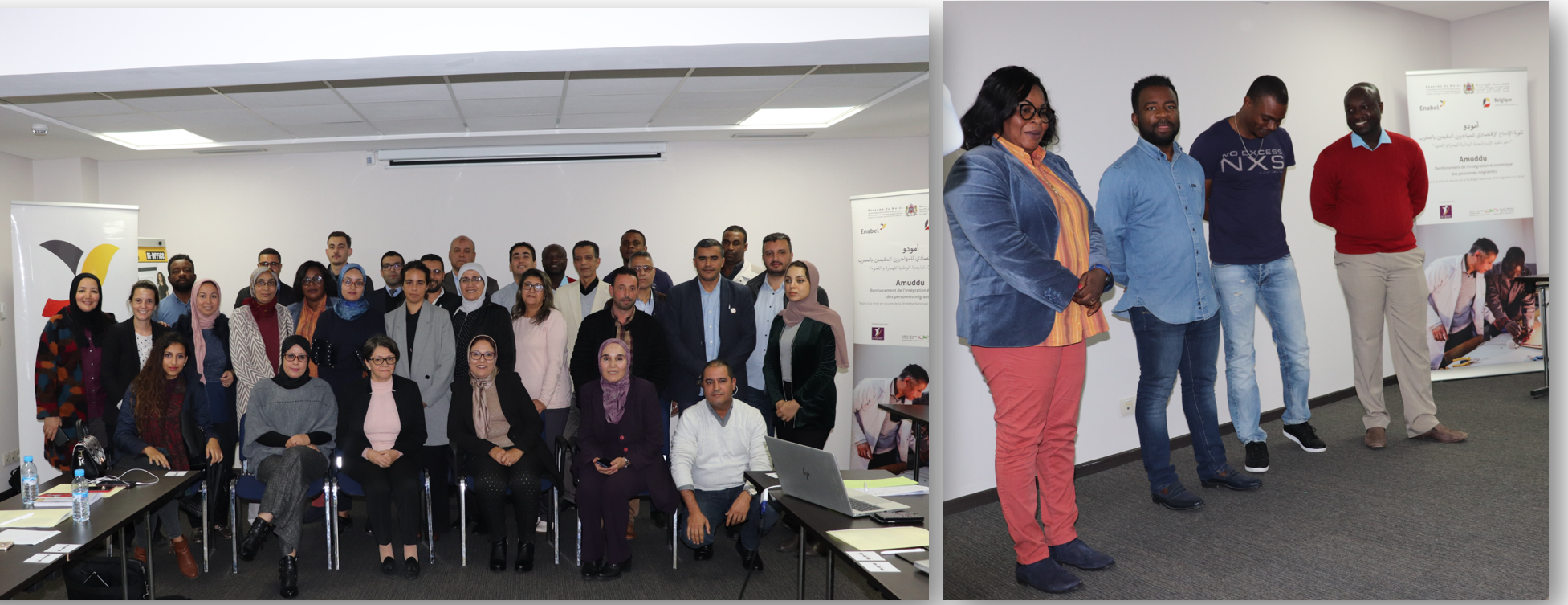
Augmentation du nombre de personnes migrantes inscrites au service public d’emploi grâce au travail des agents communautaires
Saïd SAHLI | 20/12/2019
L’institution d’assistance sociale (Entraide nationale) et le service public d’emploi (ANAPEC) marocains identifient des pistes pour améliorer le référencement des personnes migrantes. Le projet Amuddu lance les premières actions d’échanges et d’information entre les deux institutions pour améliorer le parcours d’insertion économique des personnes migrantes. « Le travail des agents communautaires recrutés dans le cadre du projet Amuddu a permis en quelques mois d’augmenter le flux de personnes migrant.e.s vers les agences de l’ANAPEC traduit par l’accroissement d’inscriptions, d’orientations et d’insertions », a affirmé la Cheffe de Service développement de la formation qualifiante et de reconversion à l’Agence Nationale de Promotion de l'Emploi et des Compétences (ANAPEC). Elle a vivement loué cette approche innovante qui consiste à renforcer les liens de confiance entre les personnes migrantes et les institutions publiques à travers le travail de proximité des agents communautaires issus de la population migrante installés au sein des agences du service public d’emploi. Ces constats ont été partagés lors de l’atelier d’échange avec le personnel de l’Entraide nationale (EN) organisé le 14 novembre 2019 à Rabat et qui a été répliqué au niveau de Casablanca cinq jours plus tard. La rencontre, qui a connu la participation de plus de 35 personnes représentant les institutions publiques offrant des prestations inhérentes à la formation professionnelle et l’accompagnement à l’insertion économique, visait à informer le personnel de l’EN sur le projet « Amuddu » et sur l’offre de service de l’ANAPEC. Ces échanges entre les représentantes des deux institutions nationales ont permis, entre autres, de dégager des voies d’échanges concrètes et pratiques pour une meilleure coordination et par ricochet à asseoir un processus de référencement systématique lié au parcours d’intégration économique des personnes migrantes. « Je suis très heureuse du cadre de coopération liant l’Entraide Nationale et Enabel qui est toujours à l’écoute de ses partenaires via son projet Amuddu », dixit Mme Zohra El Hamdadi, responsable au Service de la coopération et du partenariat de cette institution. A l’issu de cet atelier, ponctué par des moments très conviviaux, notamment lors des présentations des agents communautaire issue de la population migrante installés au niveau de ces institutions publiques, les participant.e.s ont eu le plaisir de connaitre les missions de ces agents recruté.e.s par Enabel dans le cadre du projet Amuddu pour doublement, renforcer ses actions de proximité vis-à-vis de la cible migrante et tester une approche novatrice en appui institutionnel à ses partenaires. Dans le même continuum, les participants ont insisté sur la nécessité de renforcer la coordination et de dynamiser davantage les échanges entre l’EN et l’ANAPEC. Cette collaboration sera traduite par des actions conjointes d’information, de formations et d’élaboration d’outils de communication communs qui regroupent les gammes de services offerts et prestés par les deux institutions étatiques dans un format digital et matériel/support de communication.
-
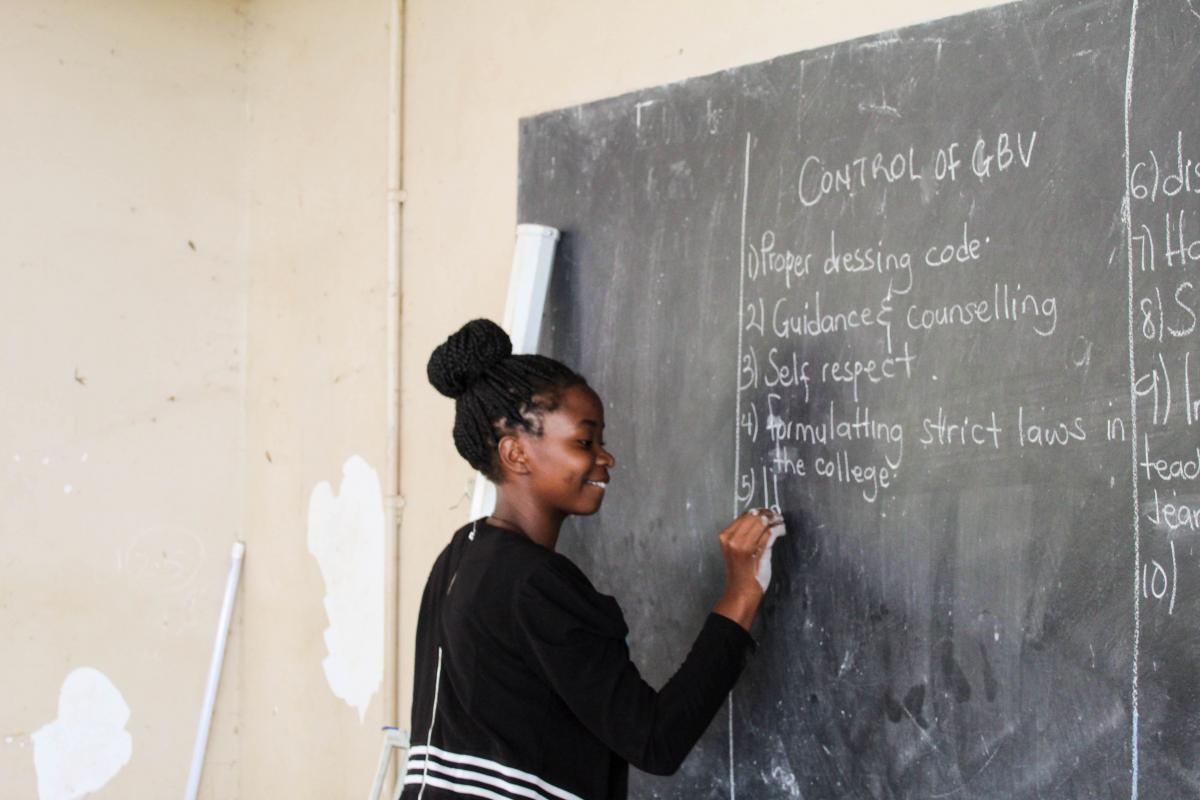
Teacher Trainers at the Forefront of Ending Gender-Based Violence in the National Teachers' Colleges - Uganda
Dorothy KYAMAZIMA | 13/12/2019
“In 2017, a female student confided in me to arbitrate a situation between her and a male student who had impregnated her and later denied the pregnancy yet they were going to leave the college. Its incidents like these and many others that inspired me to shoot this film as a film is a good platform to attract attention to GBV in NTCs and appease emotions,” says Ms Sarah Nawoova, a Lecturer of Music and Language in NTC Kaliro. According to the GBV study which was commissioned by the Ministry of Education and Sports, with support from the Belgium – Uganda Study Fund, Ghent University (Belgium) and Mbarara University (Uganda), it was found that more women than men had experienced some form of violence. This greatly affects their academic performance since it poses a barrier to quality education and students lose the ability to focus on education because of the psychological and physical torture. Since education has a pivotal role to play in sustainable development, Enabel, the Belgian development agency is supporting the need to create a safe learning environment in these training institutions. In doing so, the Teacher Training Education (TTE) Project which is supported by Enabel, is working with teaching staff in the NTCs of Kabale, Kaliro, Mubende, Muni and Unyama to end GBV in the colleges. The centrality of the teaching staff has been well established as the GBV study findings have equipped them with the knowledge to identify and control the prevailing forms of GBV in the NTCs. The teaching staff are key people when it comes to raising awareness and behavioural change among the students and the managerial personnel and because of this position, they have taken it upon themselves to raise awareness and address the different forms of GBV in the NTCs. Ms Sarah Nawoova of NTC Kaliro shot a short film and composed a poem among other awareness-raising tools, in a bid to educate the students and staff about the different forms of GBV. “I felt that writing something related to students experience and acting it out would pass on the message in addition to speaking about it,” added Ms Sarah Nawoova. During the dissemination of the study findings, gender-responsive trainings were held for teacher trainers especially in the areas of hygiene, sexual violence and they were trained on how to respond to Gender-based violence in the NTCs through action strategies like Public Dialogues, Sensitization sessions among others.Teacher trainers were also encouraged to provide a conducive environment where victims of GBV can approach them and also counsel them throughout the process in order to fully achieve the SDG 4.
-

Responding to Gender-Based Violence in the National Teachers' Colleges
Dorothy KYAMAZIMA | 13/12/2019
NTC Kaliro lecturer Sarah Nawoova, the winner of the 2018-2019 Action Research contest created a documentary on Gender-Based Violence as a way to respond and end GBV within the college. This she says is a theme unexplored until today. The Teacher Training Education Project supports the National Teachers’ Colleges in creating a Safe Learning Environment (SLE) that will end GBV and improve the quality of education.
-
JUDITH THE TRAINED CEO FOR THE BJG UNISEX SALOON IN ABIM -UGANDA
Joseph BASOGA | 12/12/2019
Judith proudly displays her signpost that brands her saloon located in the small-town centre building in Apekare Abim District. She says that the Skills that she acquired have helped her live a better life. “The journey has not been a bed of roses. I was born in an impoverished family. I earned a living by vending maize and I could hardly afford the basic needs in life. This taught me to appreciate the skills I got” she summarises her journey as if to tell a story of vulnerable girl who escaped extreme poverty due to skilling. Her desire was to become a secondary school teacher but she does not mind being a hair stylist This is how it all begun! One particular Sunday while attending church service at Abim Church of Uganda, the service programme manager announced opportunities to train young Karamajongs in hairstyling and other skills. She took on the opportunity without hesitation and for 6 months she attended training under Brac. It is after this training that the “Go smart group saloon” was birthed. After making some savings she broke away from the group to form BJG Unisex salon in Abim. Judith not just a hair stylist but a certified trainer and chief executive officer of BJG. Her dream is to become a community trainer under a bigger organisation. “Business is seasonal but we are managing. Life is better” she confidently remarks. Her life motto is “no condition is permanent, seek, believe and work!”
-

Cassava value chain in Kigoma Region.
Deogratius KIMENA | 09/12/2019
Cassava is the food crop grown in Kigoma region by most farmers. Due to low cost of production most farmers prefer to produce cassava as a food security strategy and business as well especially for export to Burundi, Uganda and Rwanda. This video depicts interventions made by SAKiRP in different dimensions of cassava value chain in Kigoma
-
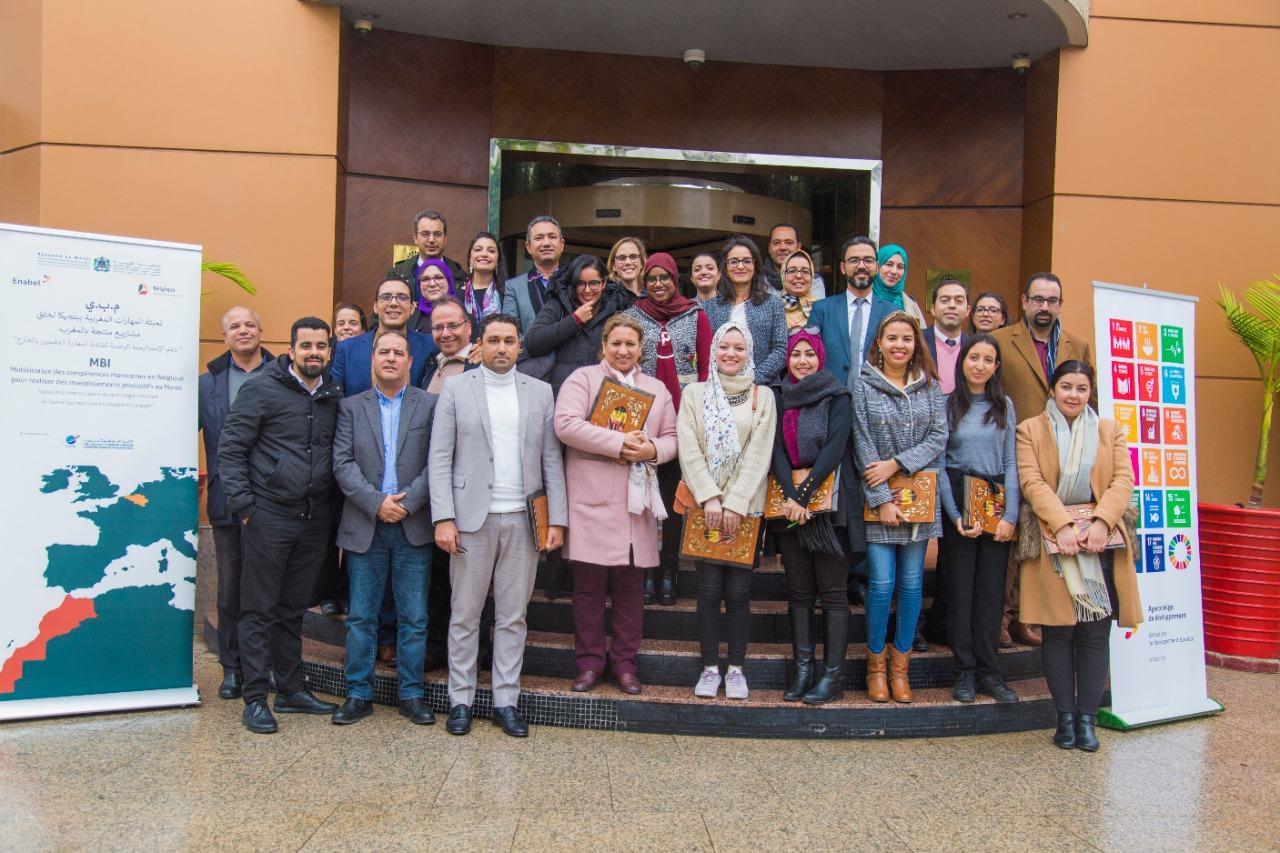
Innovation Impulse
Meriem HILALI | 29/11/2019
Dans le cadre des activités du projet Maghreb Belgium Impulse #MBI , le Ministère délégué auprès du Ministre des Affaires Etrangères, de la Coopération Africaine, en charge des MRE et Enabel au Maroc ont organisé une formation/actions autour du thème: "Innovation Impulse: L'intrapreneuriat levier d'excellence" et ce du 19 au 22 Novembre 2019 à Rabat. Cette formation a connu la participation des collaborateurs du #ministère, de la #CGEM et d'#Enabel.
-

A la rencontre des acteurs clés qui assurent l’accompagnement des primo-arrivants en Belgique
Saïd SAHLI | 28/11/2019
Pour trouver un job ou créer un business dans une des villes les plus cosmopolites du monde, Bruxelles, les personnes migrantes, « primo-arrivants », suivent une trajectoire individualisée. Découverte faite par une délégation marocaine d’institutions publiques dans le cadre du projet Amuddu – Enabel. « C’est extraordinaire que de constater le dense réseau et le maillage des acteurs institutionnels, privés et des associations qui œuvrent ensemble, et qui arrivent à faire un travail harmonisé et de proximité, efficace, toutefois fort complexe à appréhender », dixit Mme. Chahine, cheffe de service de l’intégration économique au sein du Ministère délégué chargé des Marocains résidants à l’étranger et des Affaires de la Migration (MCMREAM). Impression, d’ailleurs, partagée par l’ensemble des membres de la délégation marocaine -cadres au sein de différentes institutions publiques responsables de l’intégration économique des personnes migrantes au Maroc-, lors de leur visite d’échange en Belgique, effectuée du 7 au 11 octobre dans le cadre des activités du projet Amuddu. Cette visite visait à renforcer les synergies et les mécanismes de coordination du Comité programme « Formation professionnelle et emploi », chargé d’assurer le suivi de la Stratégie Nationale d’Immigration et d’Asile du Maroc en ce qui concerne l’intégration professionnelle des personnes migrantes. En effet, elle a permis aux participant.e.s de découvrir de bonnes pratiques en matière de travail coordonné en Belgique en ce qui concerne l’accompagnement individuel des personnes migrant.e.s dans leur parcours d’intégration, de l’accueil à l’insertion professionnelle -aussi bien à l’emploi qu’à la création d’entreprises viables-. La synergie et la coordination entre les acteurs étaient les maitres-mots récurrents, qui revenaient avec force et à chaque fois que les membres du comité découvraient une expérience au niveau de ces territoires marqués par une diversité extraordinaire et un brassage culturel inouïe. L’innovation dans le domaine de l’économie sociale était également à l’ordre du jour dans le programme de la visite. La délégation marocaine a eu l’occasion de rencontrer les femmes membres de la coopérative « RCOOP ». Regroupées et organisées dans un cadre innovant de coopérative de service, « RCOOP » réunit des femmes indépendantes dans tout ce que comporte ce terme comme acception. En effet, autonomes aussi bien dans leurs esprits entrepreneurials, que dans leurs statuts d’indépendant.es, elles prestent leurs services de coiffure et d’esthétique dans un salon chic (plate-forme commune) situé en plein centre de Bruxelles au niveau du quartier Matonge. Ce cadre organisationnel impulsé par la commune, octroie aux bénéficiaires un appui transversal en gestion et comptabilité, assuré par une directrice employée à plein temps, pour mener à bien leur business. Des témoignages poignants relatés par les femmes bénéficiaires de ce projet ont permis aux membres de la délégation marocaine d’y avoir plausiblement une bonne pratique transférable. Le focus sur les mécanismes de financement des initiatives entrepreneuriales ont aussi éveillé l’intérêt de la délégation marocaine, en ce sens que les projets sont coconstruits avec les migrant.e.s qui bénéficient au fur et à mesure dans leur guidance, de formations sur mesure et de services de mentoring et coaching pour renforcer aussi bien leur capital de leadership que le savoir-faire en mangement de projet. Dans ce sens, deux approches innovantes, quant à l’accès à l’information et à l’accompagnement à la formation des personnes vulnérables, ont été présentées aux participant.e.s. La première approche est mise en œuvre par la Cité des métiers à Bruxelles, à travers les projets HOP et X’PLORE, ciblant les jeunes éloignés du marché de l’emploi -jeunes ni scolarisés ni salariés[1]-. A travers un lieu ouvert à tous les publics en recherche d'information pour la construction de leur avenir professionnel, respectant des principes de libre accès, d'anonymat et de gratuité, cet outil permet d'aiguiller et d’informer les usagers vers tous les moyens d'élaboration et de réalisation d'objectifs professionnels et de les accompagner dans leurs choix en offrant dans un lieu unique un paquet de prestation de service en accompagnement. La deuxième approche innovante est matérialisée à travers l’initiative AZO[2], projet financé par l’UE dédié aux réfugiés. Cette initiative, lancée dans la région de Flandre, vise à assurer la co-construction de projets d’auto-emploi des personnes réfugiées de l’amont à l’aval comme fil conducteur de l’accompagnement jusqu’à la concrétisation du projet. Finalement, le concept du mentorat a suscité également énormément d’intérêt de la part des participant.e.s ; notamment, les actions menées par l’organisation Duo For A Job visant à mettre en place un système de matching entre des mentors expérimenté.e.s et des « menté.e.s » motivés. Le but du travail de Duo For A Job vise à mettre à disposition des jeunes, notamment des personnes migrantes, des outils et surtout un réseau permettant de faciliter le décrochage d’un emploi ou, dans d’autres cas, de réussir le lancement d’une initiative entrepreneuriale. Cette expérience est d’autant plus intéressante sachant que, dans le cadre de l’intervention Amuddu, une étude de faisabilité sur cette approche est en train d’être élaborée. En somme, l’accompagnement des « primo-arrivants » migrant.e.s à l’intégration et à l’insertion au marché de l’emploi est le fer de lance de différentes institutions, comme Fedasil, VDAB, ACTIRIS et leurs partenaires. Notes : [1] Neither in Employment nor in Education or Training (NEET) [2] www.projetctazo.be Clé de lecture des acronymes : CIRE Coordination et Initiative pour Réfugiés et Etrangers. CPAS Centre Public d’Action Sociale. FEDASIL Agence Fédérale pour l’Accueil des Demandeurs d’Asile. FOREM Service Public de l'Emploi et de la Formation en Wallonie. FP Formation Professionnelle. MCMREAM Ministère délégué auprès du Ministre des Affaires Etrangères et de la Coopération Internationale Chargé des Marocains Résidant à l’Etranger et des Affaires de la Migration. MTIP Ministère du Travail et de l’Insertion Professionnelle. OFPPT Office de la Formation Professionnelle et de la Promotion du Travail. SNIA Stratégie Nationale d’Immigration et d’Asile. TPE Très Petites Entreprises. VDAB Vlaamse Dienst voor Arbeidsbemiddeling en Beroepsopleiding - Service d’Emploi et de la Formation Professionnelle Flamand. BON Bureau bruxellois pour l’intégration civique. BAPA Bureau d’accueil pour Primo-Arrivants. ACTIRIS Office Régional Bruxellois de l'Emploi. Cité des métiers Une Cité des métiers est un lieu multi partenarial, ouvert à tous les publics en recherche d'information pour la construction de leur avenir professionnel, respectant des principes de libre accès, d'anonymat et de gratuité. Projet AZO Projetct a Starting up a business in Flanders RCOOP Coopérative à finalité sociale reconnue comme entreprise sociale et soutenue par la Région de Bruxelles Capitale. Duo For A Job Organisme mettant en contact des jeunes chercheurs d’emploi issus de l’immigration avec des personnes de plus de 50 ans, expérimentées, du même secteur professionnel, afin que ces dernières les accompagnent dans leur recherche d’emploi. Une fois mis en duo, le jeune et son mentor se rencontrent à raison de 2 heures par semaine pendant 6 mois. DUO for a JOB offre ses services aux jeunes et aux mentors potentiels dans les régions de Bruxelles, Liège, Gand et Anvers.
-
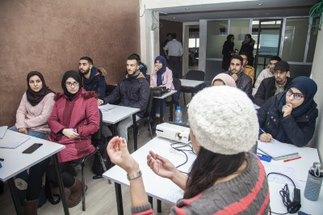
120 applicants selected to start five-month training
Guido COUCK | 28/11/2019
Brussels, 27 November 2019 | The European Union, the International Centre for Migration Policy Development (ICMPD) and the Belgian development agency Enabel test an innovative labour migration model linking Morocco’s growing ICT sector with Flanders’ qualified ICT workers shortages.This Global Skills Partnership model is based on the assumption that labour mobility can only benefit the parties when potential employees are able to find a qualified job both in their country of origin and in the country of destination.The ‘Pilot Project Addressing Labour Shortages Through Innovative Labour Migration Models’ (PALIM) runs from 1 March 2019 to 31 August 2020. It is implemented by the Belgian development agency Enabel, in partnership with the Flemish employment and vocational training service (VDAB), the Moroccan National Agency for the Promotion of Employment and Competences (ANAPEC), the Flemish employers federations (VOKA), the General Confederation of Enterprises of Morocco (CGEM), the Belgian Federation for the Technology Industry (AGORIA) and the Moroccan Federation of Information Technology, Telecommunications and Offshoring (APEBI).The world is changing and cross-border solutions help to match workforce demand with resources. "This new project will contribute to our reflection on the relations between development and migrations, whilst both Morocco and Belgium benefit from the initiative", declares Jean Van Wetter, Managing director of Enabel.9,677 applicants responded to a call launched by ANAPEC. On 12 November, following selection, 120 of them, originating from all parts of Morocco and with 18% women among them, started a five-month course in Morocco which is to boost their employability thanks to ICT, soft skills and English classes as well as information on life in Belgium.Ninety applicants are coached to subsequently find employment in Morocco, whereas thirty applicants will be given an opportunity to work in Flanders. The first Moroccan IT workers are scheduled to start in Flanders in the second quarter of 2020.In October, the project organised information sessions for Flemish companies, which, so far, offer 20 jobs. ANAPEC will also be accompanied to develop its services in Morocco, where an estimated 30,000 IT professionals are needed by 2020 and training is not sufficiently aligned with job market needs.Furthermore, an academic research component is incorporated into the project through a partnership with the University of Ghent and UCLouvain.The project’s budget amounts to 1.5 million euros. It is implemented by Enabel with European Union funding. This innovative initiative is one of the regular migration pilot projects financed via the Mobility Partnership Facility, which is managed by the International Centre for Migration Policy Development (ICMPD). This model, which brings together a broad range of actors, can later be duplicated in other labour market segments and in other countries.
-
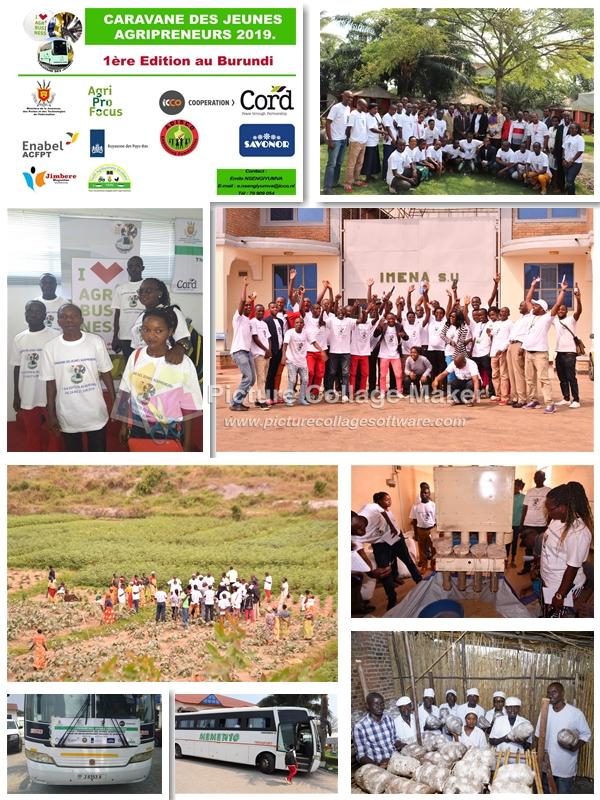
Caravane des jeunes agripreneur.e.s 1ère Edition juin 2019
Aimé GIRUKWIGOMBA | 27/11/2019
Le projet ACFPT, mis en oeuvre par Enabel au Burundi a co-contribué, en collaboration avec AgriProFocus, à l'organisation de la caravane des jeunes agripreneur.e.s au Burundi. AgriProFocus est un réseau de promotion de l’entrepreneuriat agricole inclusif financé par la Coopération hollandaise.Six(6) lauréats (4 garçons et 2 filles) issus des Centres d'Enseignements de Métiers appuyés par le projet, ont reçu une formation innovante en Myciculture (Culture et transformation des Champignons). Dans le cadre de leur processus d'insertion, le projet a soutenu leur participation à cette caravane composée d'une quarantaine de jeunes en tout. L'objectif était de stimuler leurs capacités d'interagir avec d'autres jeunes agripreneur.e.s ; de promouvoir l'agriculture et l'agro-industrie comme un secteur prometteur pour les jeunes; de contribuer au développement du leadership des jeunes entrepreneures; de mutualiser les actions des différents acteurs engagés dans l’insertion et l'entrepreneuriat des jeunes.Ladite Caravane s'est déroulée du 24 au 27 juin 2019 et a porté sur un ensemble de visites des Entreprises/Coopératives d'agri-business, des Unités de transformation et des Centres de recherches agricoles à travers le Burundi. Les retours des jeunes ont été très positifs : La prise de conscience sur les défis et les difficultés d'entreprendre, la nécessité de conjuguer les efforts (esprit collaboratif) pour réussir et l'importance de l'Entrepreneuriat "en réseau"(chaînes de valeur) pour minimiser les coûts et être plus rentables.
-
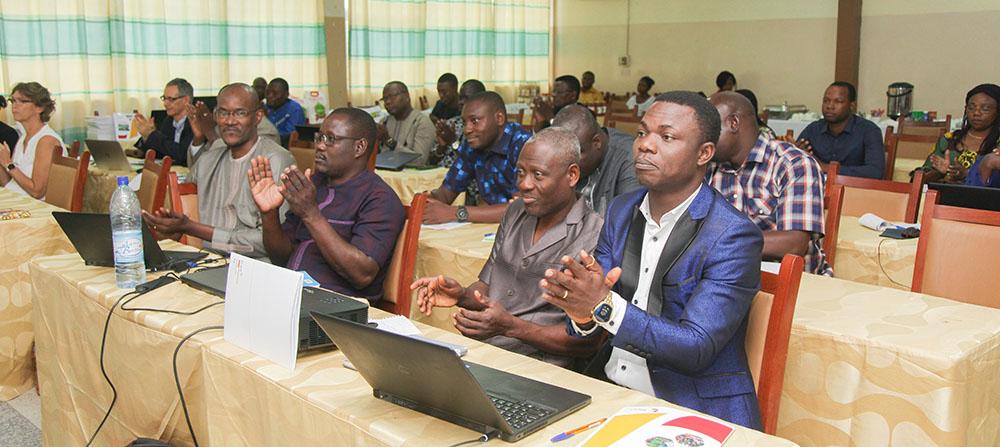
Les acquis du programme PROFI-VO partagés
Reece-hermine ADANWENON | 22/11/2019
Les acteurs du système agricole au Bénin se sont réunis le jeudi 21 Novembre 2019 à l’Infosec de Cotonou pour passer en revue les acquis du Volet Opérationnel du Programme de Développement des Filières Agricoles (PROFI-VO). Durant ce atelier qui a regroupé plusieurs catégories d’acteurs (ministères, partenaires techniques et financiers, Organisations Non-Gouvernementales, Organisations Professionnelles Agricoles), les pratiques innovantes en matière d’accompagnement du secteur agricole et les pratiques de promotion des filières agricoles développées par le PROFI-VO dans les départements de l’Atacora, de la Donga, du Mono et du Couffo ont été partagées en terme de processus, d’approches, de résultats obtenus d’incidences sur les filières.Quatre allocutions ont marqué la cérémonie officielle d’ouverture de l’atelier présidé par le Représentant du Secrétariat Général du Ministère de l’Agriculture, de l’Elevage et de la Pêche (MAEP). Il s’agit du mot de bienvenue de Mr Yacoubou ALOU ZACKARY, Responsable Délégué du PROFI VO, du mot d’encouragement de Mme Mélanie SCHELLENS, chef de Coopération Belge représentant l’Ambassadeur du Royaume de Belgique près le Bénin, des discours de Mr Jean-François MICHEL, Représentant Résident de Enabel au Bénin et de Mr Emmanuel ZINSOU, Représentant du Secrétaire Général du MAEP.Pour Mélanie SCHELLENS, il est important de tirer des leçons, de partager ces leçons et de consolider les acquis du Programme PROFI. « Nous avons tendance à croire qu’à la fin d’un programme on clôture, et on commence autre chose. Il est très important de garder à l’esprit que la clôture d’un programme n’est pas la vraie fin, mais c’est plutôt un moment pour réfléchir et pour continuer le travail afin d’y apporter des améliorations ».Selon Jean-François MICHEL, le PROFI VO, Programme Agriculture de la Coopération bénino-belge de concert avec l’ensemble des acteurs des filières riz, anacarde et maraîchage, durant 4 ans, a facilité des processus, développé et mis en œuvre des approches et initié des actions dans de nombreux domaines en droite ligne avec les axes prioritaires du Plan Stratégique de Développement du Secteur Agricole (PSDSA). La professionnalisation des exploitations agricoles familiales, le développement d’une offre de services de qualité, l’appui aux communes dans les processus de planification et d’investissements dans le secteur agricole, le renforcement des acteurs et l’amélioration de la gouvernance des filières agricoles dans sont autant de domaines qui ont bénéficié avec succès du soutien technique et financier du Programme d’Appui au Développement Agricole (PROFI-VO).A l’en croire, cet atelier de partage permettra d’apprécier les résultats et acquis du Programme. A ce propos, il a invité les participants à accorder une attention particulière aux différentes présentations qui seront faites et à analyser les expériences présentées pour en tirer des leçons pour les interventions actuelles et futures.Emmanuel ZINSOU, représentant le Secrétaire Général du MAEP n’a pas manqué de remercier le Royaume de Belgique pour son appui constant au secteur agricole et son engagement aux côtés du Bénin depuis plus de 20 ans d’existence de l’Agence belge de développement au Bénin « Enabel au Bénin ».Rappelons que plusieurs thématiques ont fait l’objet de présentation et d’échanges au cours de cet atelier. Il s’agit de : - La mise en place d’un dispositif de financement des acteurs des filières - La fourniture de services non financiers - L’expérience de mise en place des clusters agricoles - Le financement des investissements structurants dans le secteur agricole
-
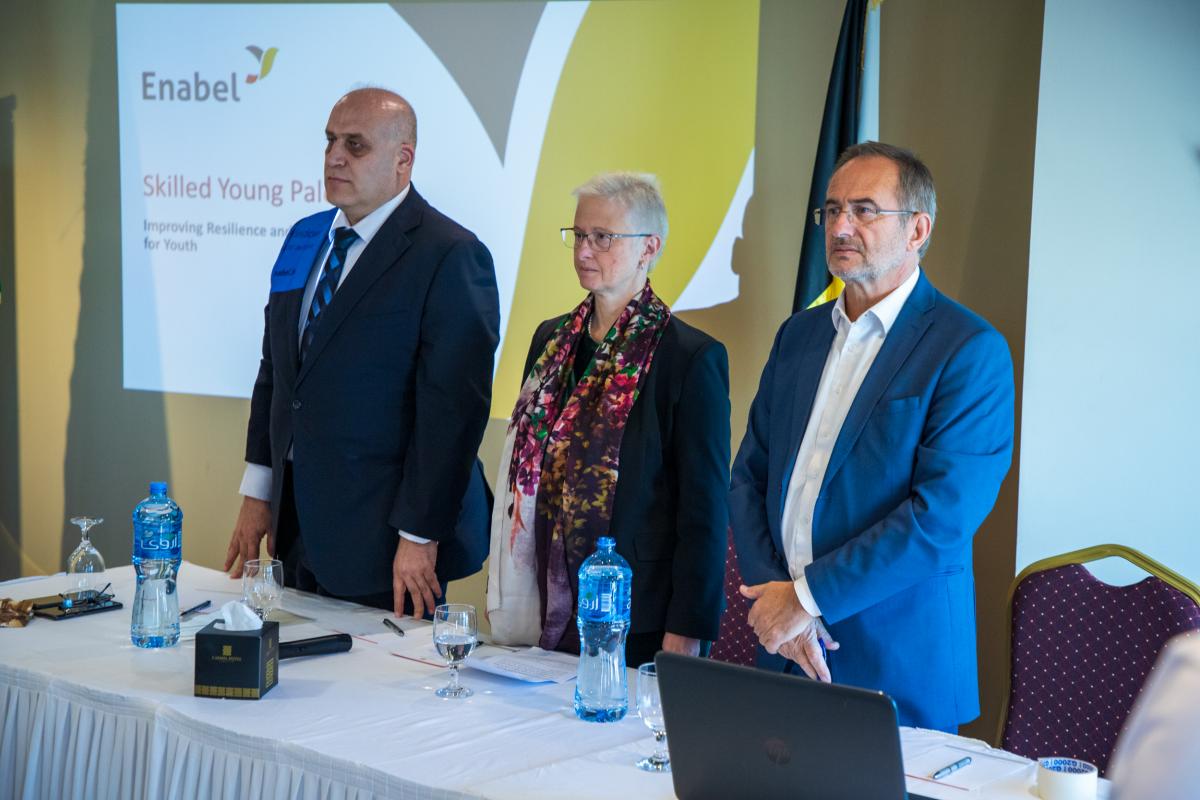
Launching of the Skilled Young Palestine (SYP) Project
Roula HANDAL | 20/11/2019
The Skilled Young Palestine “Improving Resilience and Job opportunities for Youth” Project was launched on Tuesday, November 19th, 2019 in Ramallah in the presence of H.E. Dr. Nasri Abu Jaish, the Palestinian Minister of Labor and H.E. Mrs. Danielle Haven, Consul General of Belgium with a budget of 4 million Euros and a duration of 36 months. The project aims to support Palestine in gaining economic autonomy, building up and increasing the resilience among Palestinian youth in vulnerable areas in Palestine by improving the transition to employment and self-employment through improved skills and competences. This will be done through the provision of technical skills training on the one hand and entrepreneurship key competences, life skills and digital skills training on the other hand. The proposed areas of intervention are the West Bank, Gaza and East Jerusalem.The launching ceremony was attended by Palestinian officials, Private Sector Organizations and Non-Governmental Organizations working in the field.
-

Atelier de formation sur le leadership féminin
Nènè TRAORE | 18/11/2019
Plus d’une vingtaine de femmes leaders de la région de Koulikoro ont suivi du 06 au 08 novembre 2019 à FANA une formation en leadership féminin. Cette formation visait à renforcer et développer les compétences en leadership féminin des membres des groupes thématiques et points focaux genre issues d’organisations de la société civile, de l’administration publique et des collectivités territoriales. Organisé par le Programme de coopération Mali – Belgique qui mène quatre interventions majeures au niveau de la Région de Koulikoro dans les domaines de l’élevage, la sécurité alimentaire, l’eau / assainissement ainsi que le renforcement des capacités des acteurs étatiques et non étatiques qui y sont impliqués. La thématique genre et autonomisation de la femme constitue une thématique transversale de ce programme exécuté par Enabel et les partenaires maliens. La vidéo suivante pour plus de précisions sur l'atelier et impressions des participants.
-
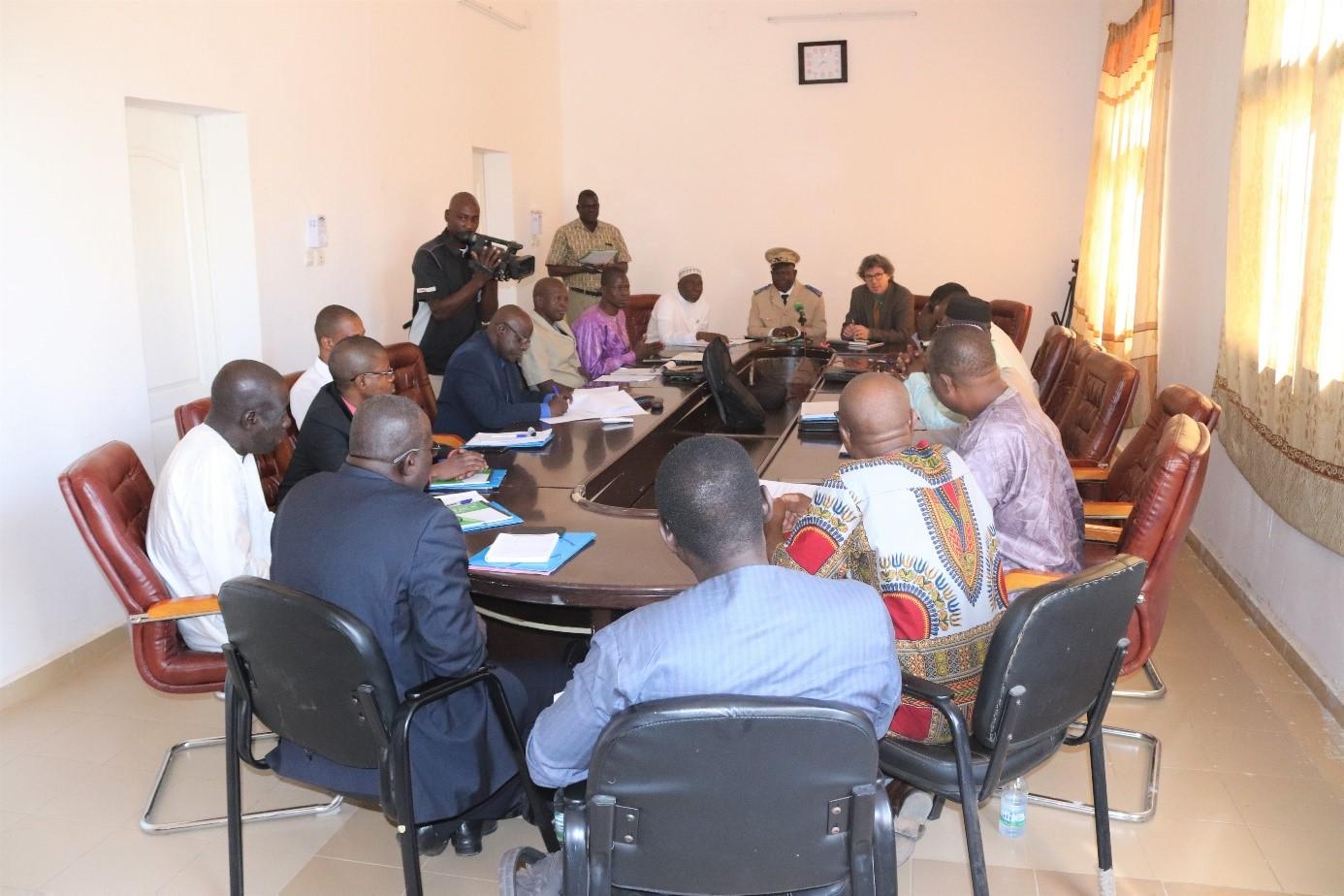
Développement Régional: Le projet d’Accès à l’Eau Potable et Assainissement dans la région de Koulikoro PEPAK a tenu son premier comité de pilotage.
Nènè TRAORE | 18/11/2019
Le jeudi 31 octobre a eu lieu le premier comité de pilotage du projet projet d’Accès à l’Eau Potable et l’Assainissement dans la région de Koulikoro (PEPAK). Financé par le Royaume de Belgique pour une durée de 48 mois, ce projet vise à améliorer l’approvisionnement en eau potable et l’accès aux conditions d’assainissement pour les populations des centres ruraux et semi-urbains de la région de Koulikoro. L’accès à l’eau potable et l’amélioration des conditions d’accès à l’assainissement garantissant une bonne santé pour les populations maliennes, représentent une préoccupation majeure pour les hautes autorités maliennes et les partenaires au développement. C’est dans cet esprit que le Royaume de Belgique et le Gouvernement du Mali ont mis en place un projet exclusivement dédié à ce sujet dans la région de Koulikoro. Une région qui retient la part importante des investissements du programme de coopération entre le Mali et la Belgique. Le projet PEPAK a tenu la première session ordinaire de son comité de pilotage ce jeudi 31 octobre 2019 avec comme objectif, d’examiner et approuver le cadre de suivi et évaluation du projet, mais aussi d’examiner et approuver la planification opérationnelle et financière des activités de l’année 2019. Cela dans la perspective d’assurer la validation du rapport de démarrage du projet. L’ouverture des travaux était présidée par le Gouverneur de la région de Koulikoro, représenté par son Directeur de cabinet en présence du Représentant Résident de Enabel au Mali M. JOHANNES SCHOORS. La rencontre a, de ce fait, enregistré la présence de tous les membres du comité de pilotage. Le Représentant Résident d’Enabel au Mali dans son intervention a appelé à la responsabilité de tous les membres du comité de pilotage par rapport à la thématique du projet : « Le thème est très important parce qu’il affecte directement le fonctionnement de la ville et le bien-être des gens. Donc on est bien heureux qu’on puisse organiser ce comité de pilotage » a-t-il signalé. Durant cette journée, les membres du comité de pilotage ont passé en revue tous les documents relatifs à la mise en œuvre du projet tant sur le plan opérationnel que financier avec à la clé, les documents du suivi évaluation des résultats et la planification opérationnelle et financière des activités de l’année 2019. A cet effet, les présentations des documents et les débats ont été les modes d’usage des travaux. Un principe qui a permis à tous les membres du comité de s’approprier convenablement des contenus des documents. La méthode a permis également aux membres du comité d’apporter leurs jugements et points de vue aux documents, mais aussi de contribuer. A ce niveau que trois points essentiels ont retenus l’attention : il s’agit du document sur les planifications opérationnelles et financières 2019, le cadre de suivi évaluation des résultats et le règlement intérieur qui ont été examinés et approuvés par les membres du comité de pilotage. D’autres sujets, tels que le paiement des primes du responsable national du projet, conformément au Document Technique et Financier (DTF), prévoir un article sur la prise en charge des membres du comité dans le règlement d’ordre intérieur, le recrutement d’une secrétaire au niveau du projet ont été abordés, dans la même perspective, mais qui ont été renvoyés à une réflexion plus approfondie en attendant le prochain comité de pilotage. En fin de travaux, les participants ont manifesté leur satisfaction et se sont dit confiants de l’importance du projet et son impact sur le développement régional, particulièrement dans le cadre de l’amélioration des conditions d’hygiène et de santé. A cet effet, ils ont marqué leur soutien sans condition pour la mise en œuvre et une réussite conséquente au profit de la région de Koulikoro. Rappelons que le Projet d’amélioration de l’Accès à l’Eau Potable et à l’Assainissement dans la région de Koulikoro (PEPAK) est prévu sur une période d’exécution de 48 mois pour un budget global de 8 M€. Malgré les nombreux efforts déployés, le taux d’accès à l’eau potable au niveau du Mali a baissé de 68,5% en 2012 à 63,8% en 2014. Ainsi, le taux d’accès à un assainissement adéquat est seulement de 35 % en milieu urbain et de 14 % en milieu rural.Le secteur de l’assainissement souffre d’une insuffisance majeure d’infrastructures d’évacuation et de traitement des déchets solides et liquides, que ce soit en milieu urbain ou rural. Pour le volet « eau potable », l’intervention du projet prévoit la construction et la mise en place d’un système de gestion durable de 13 nouveaux réseaux d’Adduction d’Eeau Sommaire(AES)/Adduction d’ Eau Potable(AEP) dans les cercles de Dioila, Banamba, Kati, Kangaba, Nara et Koulikoro. Concernant le volet « assainissement », deux volets sont prévus : - Volet 1 : construction d’une station de traitement des boues de vidange (STBV) pour la ville de Koulikoro et mise en place d’une filière de collecte et de traitement des boues de vidange avec une valorisation des sous-produits, -Volet 2 : construction de latrines communautaires dans la ville de Koulikoro et les 13 centres bénéficiaires du volet AES/AEP. L’objectif global du projet PEPAK / Enabel est de contribuer aux ODD 3 et 6 de réduction de la pauvreté et d’amélioration de la santé des populations des centres ruraux et semi-urbains dans la région de Koulikoro, par un service public de l’eau et de l’assainissement durable.
-
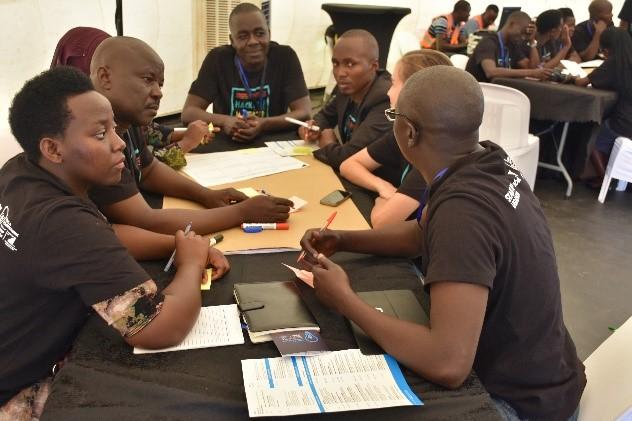
Harnessing the Power of Innovation
Dorothy KYAMAZIMA | 15/11/2019
Education is a fundamental right and the supporting structure for the entire 2030 Agenda. Audrey Azoulay (UNESCO Director General) Although the number of people accessing education in Uganda has increased, the quality of education is still low, making it hard for students to attain the necessary 21st century skills. This has prompted young and innovative minds to find out what best way to educate and equip the next generation, setting the stage for the Kampala Innovation Week 2019 (KIW). Start-up Uganda, with support from the United Nations Capital Development Fund (UNCDF), aimed at bringing together different players to create an avenue where young entrepreneurs could meet, share new ideas and build partnerships. KIW, which ran from 16th-18th October 2019, served as a platform to assemble stakeholders to raise Uganda’s profile in the start-up ecosystem and provide visibility of innovators, both locally & internationally, in order to attract investors and development partners. During the opening of KIW 2019, Hon. Frank Tumwebaze, the ICT Minister said, “The team at the Ministry championed the innovation agenda and I want to thank the agencies that feel that digital entrepreneurs if supported well, shall be able to have our own markets served and supplied by our own knowledge products.” The Belgian Development Agency was one of the partners of KIW 2019. Enabel participated in a panel discussion on the need for innovation to help realise the 2030 Agenda and organised a hackathon, dubbed ‘Hack Una Matata’, during the first day of KIW 2019. This activity saw Ugandan innovative minds develop relevant and original solutions to address the problems faced in the sector of Tourism & Hospitality, Employment and Education. 15 Groups participated in the hackathon and each group was invited to pitch to a jury about why their innovation is worthy to receive further coaching and possible integration in the different Enabel projects. The Education challenge tasked participants to find ways of using technology to transform training institutions into centres of excellence. Enabel (TTE, SDHR and SSU) also participated in the exhibition at KIW 2019. TTE showcased the Time-on-Task pilot, a digital tool to try to fight absenteeism of teachers in colleges and a free online educational platform, ‘OpenLearn Create’. It was discovered that in the NTCs, teaching was more focused on theory than practice and learning was exercised mainly in the classroom. A General methods course will be made available on ‘OpenLearn Create’ to try to tackle this problem. It will facilitate learning beyond the classroom since lecturers and students will be able to access the course anytime and anywhere. By using this free platform, students are also able to process theory and focus more on practice, through videos with examples of hands-on methods of teaching. WeHubIt, an investor in impactful digital projects, was also showcased at the expo. WeHubit aims at supporting and enhancing digitalisation as a tool to accelerate sustainable development in 14 African countries. Wehubit is implemented by the Belgian development agency Enabel alongside its partner, the Belgian Investment Company for Developing Countries, BIO. “The Wehubit initiative supports entrepreneurial ecosystems like the one displayed at KIW2019. Some digital services that have proved to work can be scaled up and that is where WeHubIt comes in. The entries are based on calls for proposals per sector and in January 2020, a call for proposals on education will be opened,” said Bart Cornille, the ID Expert with Enabel-TTE. (wehubit.be)
